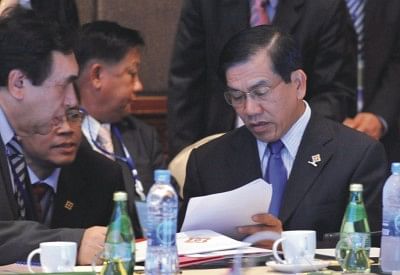US to sign friendship pact with Asean to counter China

Myanmar Foreign Minister Nyan Win confers with delegation officials during the 4th Association of Southeast Asian Nations (Asean) Coordinating Council Meeting in Phuket yesterday. US Secretary of State Hillary Clinton is now in Thailand for a regional security conference with Asean ministers expected to focus on the North Korean nuclear threat, Myanmar's rights record and terrorism. Photo: AFP
The signing by the United States this week of a friendship pact with Southeast Asia sends a strong signal of its desire to deepen ties and counter China's increasing influence, observers said.
US Secretary of State Hillary Clinton will sign the Treaty of Amity and Cooperation (TAC) on Wednesday in the Thai resort of Phuket during a meeting with her counterparts from the Association of Southeast Asian Nations (Asean).
Washington has been reluctant to sign the non-aggression pact for years, fearing it would leave little room for it to exert its influence on political and security issues in the region of nearly 600 million people.
But a resurgent China signed the treaty in 2003 to broaden its influence, and amid lingering suspicions that the US refusal showed the region was beneath its diplomatic radar, Washington has finally relented.
"Apparently the US has decided that the benefits of signing outweigh the costs," former Asean secretary general Rodolfo Severino told AFP.
The signing comes on the eve of the annual Asean Regional Forum (ARF), Asia's foremost gathering on security issues involving countries such as China, Japan, Russia, the United States and the European Union.
Southeast Asian ministers in a joint statement on Monday "welcomed the impending accession by the United States" to the treaty "as a strong signal of its commitment to peace and security in the region."
The comment reflected satisfaction after years of questions about US intentions in Southeast Asia and a perception that Washington had its mind on other regions.
The treaty, first established in 1976, commits signatories to three basic principles: the peaceful settlement of disputes, non-recourse to the use of force and non-interference in domestic affairs.
"The implication of not signing is this: if you are a power involved in the region and you don't sign it, people might ask why doesn't the US sign?" said Severino, now head of the Singapore-based Asean Studies Centre.
"Does it mean that they (US) are not precluding the use of force in settling disputes, do they want to interfere in countries' internal affairs?”

 For all latest news, follow The Daily Star's Google News channel.
For all latest news, follow The Daily Star's Google News channel. 



Comments